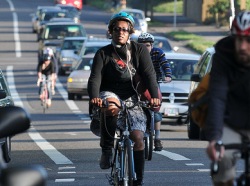
(Photo © J. Maus)
The Lifestyle section of the Washington Post carried a story yesterday titled, Black women take their place in D.C.’s bike lanes. The article touches on the complex intersection of race, gentrification, and bike infrastructure — issues Portland grapples with too.
On North Williams, a project to improve traffic safety and bicycling conditions is on hold while the City attempts to bridge a divide. As a decision to significantly improve the bikeway got closer, some people in the historically black neighborhood stepped up to express that an unfair priority was being given to bicycling and the (mostly white in their minds) people who do it.
Local business owner and Williams resident Sharon Maxwell-Hendricks told me back in April that bicycling is part of the gentrification going on in her neighborhood. “It feels like a small percentage of bicyclists are driving the changes,” she said, “it seems like it’s [bicycling] lately been a part of the whole gentrification and urban yuppie groups and something that’s being more pushed, not because it has momentum and everyone’s like, ‘It’s great! wow, we want to do this!'”
In D.C., the group Black Women Bike is using Facebook to come together and promote bicycling (they’ve got 85 members at last count). Their activism turns the conventional wisdom about race, gender and bicycling on its head.

We have a similar (although less active) group here in Portland. The Sistas Weekend Cyclers was founded in 2008 and has 39 members. The Sistas were founded by Debora Leopold Hutchins, who also happens to be a member of the Stakeholder Advisory Committee for the Williams project.
There’s also the Bicyclists of Color PDX, a Facebook group with 99 members that describes itself as, “a multicultural bicycle club out of Portland Community College. We promote and encourage people of color to saddle up and ride to promote sustainability and healthy living.”
The Washington Post story is sure to be read closely by urban bike planners and City staffers who know that bike projects will have a much better chance of going smoothly if they do not become racially divisive.
Or, as the Washington Post story puts it:
“Those pushing to expand biking infrastructure throughout the city hope that more participation by black cyclists would stem opposition to bike lanes, racks and bike-sharing facilities.”
While Portland is full of advocacy efforts focused on getting more women to ride bikes (as this recent story on PBOT’s Women on Bikes program nicely highlights), I’m not aware of any that are specifically targeted to black women. Perhaps — given the growing awareness of this issue and the trajectory of the Williams project — this will soon change.
If you have a few minutes, I’d highly recommend reading the Washington Post article. I’d also love to hear more from readers about this issue and how you think it might/should play out in Portland.

